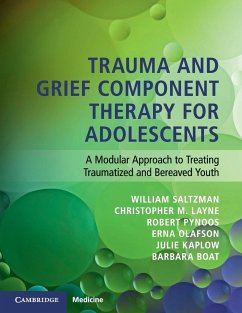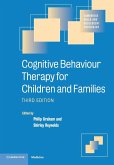William Saltzman, Christopher Layne, Robert Pynoos
Trauma and Grief Component Therapy for Adolescents
William Saltzman, Christopher Layne, Robert Pynoos
Trauma and Grief Component Therapy for Adolescents
- Broschiertes Buch
- Merkliste
- Auf die Merkliste
- Bewerten Bewerten
- Teilen
- Produkt teilen
- Produkterinnerung
- Produkterinnerung
A guide for treating trauma and bereavement that can be flexibly implemented in group and individual settings to empower adolescents.
Andere Kunden interessierten sich auch für
![Cognitive Behaviour Therapy for Children and Families Cognitive Behaviour Therapy for Children and Families]() Cognitive Behaviour Therapy for Children and Families124,99 €
Cognitive Behaviour Therapy for Children and Families124,99 €![The Social Psychology of Trauma The Social Psychology of Trauma]() Orla T MuldoonThe Social Psychology of Trauma121,99 €
Orla T MuldoonThe Social Psychology of Trauma121,99 €![Healing Healing]() Thomas InselHealing35,99 €
Thomas InselHealing35,99 €![Exposure Therapy For Children And Adolescents Exposure Therapy For Children And Adolescents]() Lulu JamesExposure Therapy For Children And Adolescents28,99 €
Lulu JamesExposure Therapy For Children And Adolescents28,99 €![Transformations - Healing Trauma with Psychedelic Therapy Transformations - Healing Trauma with Psychedelic Therapy]() Dale L CarruthTransformations - Healing Trauma with Psychedelic Therapy21,99 €
Dale L CarruthTransformations - Healing Trauma with Psychedelic Therapy21,99 €![Third-Wave Cognitive Therapy for the Treatment of Loss and Grief Third-Wave Cognitive Therapy for the Treatment of Loss and Grief]() Faramarz HashempourThird-Wave Cognitive Therapy for the Treatment of Loss and Grief174,99 €
Faramarz HashempourThird-Wave Cognitive Therapy for the Treatment of Loss and Grief174,99 €![AutPlay Therapy for Children and Adolescents on the Autism Spectrum AutPlay Therapy for Children and Adolescents on the Autism Spectrum]() Robert Jason GrantAutPlay Therapy for Children and Adolescents on the Autism Spectrum236,99 €
Robert Jason GrantAutPlay Therapy for Children and Adolescents on the Autism Spectrum236,99 €-
-
-
A guide for treating trauma and bereavement that can be flexibly implemented in group and individual settings to empower adolescents.
Hinweis: Dieser Artikel kann nur an eine deutsche Lieferadresse ausgeliefert werden.
Hinweis: Dieser Artikel kann nur an eine deutsche Lieferadresse ausgeliefert werden.
Produktdetails
- Produktdetails
- Verlag: Cambridge University Press
- Seitenzahl: 334
- Erscheinungstermin: 8. März 2019
- Englisch
- Abmessung: 280mm x 216mm x 18mm
- Gewicht: 843g
- ISBN-13: 9781107579040
- ISBN-10: 110757904X
- Artikelnr.: 48688999
- Herstellerkennzeichnung
- Libri GmbH
- Europaallee 1
- 36244 Bad Hersfeld
- gpsr@libri.de
- Verlag: Cambridge University Press
- Seitenzahl: 334
- Erscheinungstermin: 8. März 2019
- Englisch
- Abmessung: 280mm x 216mm x 18mm
- Gewicht: 843g
- ISBN-13: 9781107579040
- ISBN-10: 110757904X
- Artikelnr.: 48688999
- Herstellerkennzeichnung
- Libri GmbH
- Europaallee 1
- 36244 Bad Hersfeld
- gpsr@libri.de
William Saltzman, Ph.D., is a licensed clinical psychologist and holds a primary appointment as Professor of Counseling at California State University, Long Beach. Dr Saltzman also serves as Associate Director of the University of California, Los Angeles, Nathanson Family Resilience Center. For the past twenty years, Dr Saltzman has developed, disseminated, and evaluated programs for youth and families impacted by trauma, violence, illness and loss. He and the other authors regularly train and certify practitioners in how to implement TGCTA.
Introduction
TGCTA pre-treatment assessment interview: introduction, assessment, and goal setting for individual or group participation
Module 1. Foundational Knowledge and Skills: Introduction
Session 1.1 Welcome and introduction
Session 1.2 Posttraumatic and grief reactions and introduction to coping strategies
Session 1.3 Emotions and feelings
Session 1.4 Learning to cope with trauma and loss reminders
Session 1.5 Learning coping skills
Session 1.6 Sizing up a situation
Session 1.7 Identifying and replacing hurtful thoughts
Session 1.8 Recruiting effective support handouts 1.1-1.53
Module 2. Working Through Traumatic or Loss Experiences: Introduction
Session 2.1 Preparing to share personal trauma or loss experiences (sharing our stories)
Session 2.2 Group narrative sharing sessions
Session 2.3 Review of group sharing and exploration of beliefs and expectations
Session 2.4 Guide for conducting individual narrative and pullout sessions
Handouts 2.1-2.15
Module 3. Working Through Grief Experiences: Introduction
Session 3.1 Learning about grief
Session 3.2 Understanding connections between loss reminders, grief reactions, and consequences
Session 3.3 Dealing with distress over the circumstances of tragic deaths
Session 3.4 Identifying positive and negative traits
Session 3.5 Reminiscing together
Session 3.6 Planning for difficult days (relapse prevention)
Handouts 3.1-3.34
Module 4. Preparing for the Future: Introduction
Session 4.1 Next steps - promoting developmental progress
Session 4.2 Coping with difficult days
Session 4.3 What is and what is not your job
Session 4.4 Graduation and launching into the future
Handouts 4.1-4.25
Appendices.
TGCTA pre-treatment assessment interview: introduction, assessment, and goal setting for individual or group participation
Module 1. Foundational Knowledge and Skills: Introduction
Session 1.1 Welcome and introduction
Session 1.2 Posttraumatic and grief reactions and introduction to coping strategies
Session 1.3 Emotions and feelings
Session 1.4 Learning to cope with trauma and loss reminders
Session 1.5 Learning coping skills
Session 1.6 Sizing up a situation
Session 1.7 Identifying and replacing hurtful thoughts
Session 1.8 Recruiting effective support handouts 1.1-1.53
Module 2. Working Through Traumatic or Loss Experiences: Introduction
Session 2.1 Preparing to share personal trauma or loss experiences (sharing our stories)
Session 2.2 Group narrative sharing sessions
Session 2.3 Review of group sharing and exploration of beliefs and expectations
Session 2.4 Guide for conducting individual narrative and pullout sessions
Handouts 2.1-2.15
Module 3. Working Through Grief Experiences: Introduction
Session 3.1 Learning about grief
Session 3.2 Understanding connections between loss reminders, grief reactions, and consequences
Session 3.3 Dealing with distress over the circumstances of tragic deaths
Session 3.4 Identifying positive and negative traits
Session 3.5 Reminiscing together
Session 3.6 Planning for difficult days (relapse prevention)
Handouts 3.1-3.34
Module 4. Preparing for the Future: Introduction
Session 4.1 Next steps - promoting developmental progress
Session 4.2 Coping with difficult days
Session 4.3 What is and what is not your job
Session 4.4 Graduation and launching into the future
Handouts 4.1-4.25
Appendices.
Introduction
TGCTA pre-treatment assessment interview: introduction, assessment, and goal setting for individual or group participation
Module 1. Foundational Knowledge and Skills: Introduction
Session 1.1 Welcome and introduction
Session 1.2 Posttraumatic and grief reactions and introduction to coping strategies
Session 1.3 Emotions and feelings
Session 1.4 Learning to cope with trauma and loss reminders
Session 1.5 Learning coping skills
Session 1.6 Sizing up a situation
Session 1.7 Identifying and replacing hurtful thoughts
Session 1.8 Recruiting effective support handouts 1.1-1.53
Module 2. Working Through Traumatic or Loss Experiences: Introduction
Session 2.1 Preparing to share personal trauma or loss experiences (sharing our stories)
Session 2.2 Group narrative sharing sessions
Session 2.3 Review of group sharing and exploration of beliefs and expectations
Session 2.4 Guide for conducting individual narrative and pullout sessions
Handouts 2.1-2.15
Module 3. Working Through Grief Experiences: Introduction
Session 3.1 Learning about grief
Session 3.2 Understanding connections between loss reminders, grief reactions, and consequences
Session 3.3 Dealing with distress over the circumstances of tragic deaths
Session 3.4 Identifying positive and negative traits
Session 3.5 Reminiscing together
Session 3.6 Planning for difficult days (relapse prevention)
Handouts 3.1-3.34
Module 4. Preparing for the Future: Introduction
Session 4.1 Next steps - promoting developmental progress
Session 4.2 Coping with difficult days
Session 4.3 What is and what is not your job
Session 4.4 Graduation and launching into the future
Handouts 4.1-4.25
Appendices.
TGCTA pre-treatment assessment interview: introduction, assessment, and goal setting for individual or group participation
Module 1. Foundational Knowledge and Skills: Introduction
Session 1.1 Welcome and introduction
Session 1.2 Posttraumatic and grief reactions and introduction to coping strategies
Session 1.3 Emotions and feelings
Session 1.4 Learning to cope with trauma and loss reminders
Session 1.5 Learning coping skills
Session 1.6 Sizing up a situation
Session 1.7 Identifying and replacing hurtful thoughts
Session 1.8 Recruiting effective support handouts 1.1-1.53
Module 2. Working Through Traumatic or Loss Experiences: Introduction
Session 2.1 Preparing to share personal trauma or loss experiences (sharing our stories)
Session 2.2 Group narrative sharing sessions
Session 2.3 Review of group sharing and exploration of beliefs and expectations
Session 2.4 Guide for conducting individual narrative and pullout sessions
Handouts 2.1-2.15
Module 3. Working Through Grief Experiences: Introduction
Session 3.1 Learning about grief
Session 3.2 Understanding connections between loss reminders, grief reactions, and consequences
Session 3.3 Dealing with distress over the circumstances of tragic deaths
Session 3.4 Identifying positive and negative traits
Session 3.5 Reminiscing together
Session 3.6 Planning for difficult days (relapse prevention)
Handouts 3.1-3.34
Module 4. Preparing for the Future: Introduction
Session 4.1 Next steps - promoting developmental progress
Session 4.2 Coping with difficult days
Session 4.3 What is and what is not your job
Session 4.4 Graduation and launching into the future
Handouts 4.1-4.25
Appendices.








